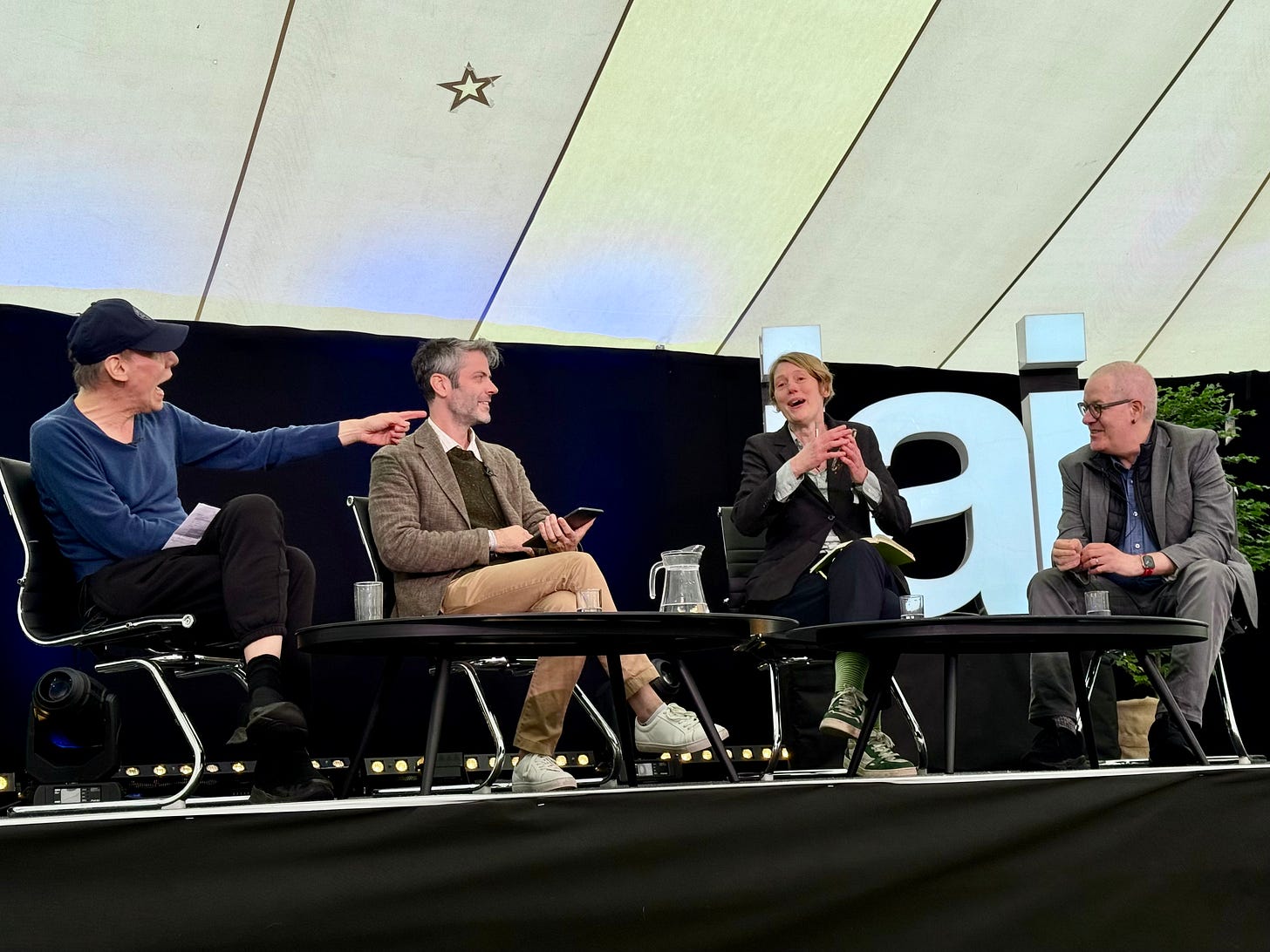Profiles in pseudoscience: Steve Fuller
The originator of social epistemology is full of it (no, not of epistemology)

It’s always a pleasure to be invited to the HowTheLightGetsIn (HTLGI) festival, which is held every year in Hay-on-Wye, a gorgeous small town in the middle of the Welsh countryside. It is the brainchild of philosopher Hilary Lawson and has been held since 2008. I’ve been invited as a speaker and panelist multiple times, engaging people on the stuff I think I know something about: evolutionary biology, philosophy of science, pseudoscience, and Stoicism.
In May 2025 I was invited again for a series of events, one of which was a panel discussion under the title “The Religion of Our Time.” Here is the description: “From AI and computer science to physics and cosmology, we assume science is the product of objective principles and experimental evidence. Many physicists however regard scientific theories as models rather than final descriptions of reality. As a result, critics argue it’s unclear what distinguishes science from tribal belief. Studies show status and hierarchy play a key role in the acceptance of theories. From Newton to Einstein, counter-evidence is ignored to retain the established theory. Some philosophers of science, like Paul Feyerabend, argue that experiments never settle the matter and that science in some respects behaves like a ‘dogmatic religious institution.’ Should we conclude that science is the religion of our time, with its priests and archbishops who determine which theories are pursued and which models are deemed true? Should we see the distinction between science and pseudoscience as a fashion of the moment? Or is there something essential and radically different about the method and the procedures of science that places it in a unique position?”
Uh-oh. There are a number of serious issues with the above. First off, whoever wrote that paragraph seems to think that there is some kind of contradiction between saying that science is the product of objective principles and experimental evidence while at the same time acknowledging that some physicists think of their theories as empirical adequate models. In reality, those models are the result of objective principles, like inductive and deductive reasoning, and they are validated (or not) by way of experimental evidence. So, no contradiction there.
But it immediately gets worse. We are told that as a result of the fact that scientific theories can be regarded as models it is “unclear what distinguishes science from tribal belief.” Wait, what? Talk about using bad logic to go from A to B! Are tribal beliefs (such as, say voodoo?) empirically adequate models of reality? I don’t think so.
Next, it is suggested that counter-evidence to Newtown and Einstein’s theories has been ignored. That’s news to me and to historians of science. Indeed, it is because counter-evidence to Newtonian mechanics has been taken seriously that Einstein was able to formulate his theories of relativity. And the latter have been subjected to tons of experimental tests, all passed with flying colors.
It is indeed true that Paul Feyerabend argued that science behaves like a dogmatic religious institutions. But Feyerabend was a seriously unorthodox philosopher of science who is simply not taken seriously by the majority of professionals in the field. At a very minimum, Feyerabend’s opinions are very much in the minority. Which doesn’t mean they are wrong, but certainly that they are not representative of the profession.
We are then asked to entertain the notion that there is no actual distinction between science and pseudoscience, you know, astronomy vs astrology, psychology vs parapsychology, and so forth. Only at the very end the possibility that science is actually special and precious is raised, almost as an afterthought.
Okay, I told myself, this is going to be fun, though I wasn’t sure why a novelist was on that panel in the first place. (Kavenna is very nice and very good at what she does, but she is neither a scientist nor a philosopher, historian, or sociologist of science.)
The problem, as it turns out, was that the third panelist was one Steve Fuller, an American social philosopher who has made a name for himself in the field of science and technology studies, an area that sounds like actual philosophy of science but has often been marred by a more or less radical postmodernist or deconstructionist approach.
Fuller and I have crossed swords before, including at previous editions of the HTLGI festival, and I have to admit that I’ve never had a high esteem of him, a sentiment, I’m sure, that it’s fully reciprocated. But this time the exchange was dramatic and, frankly, more than a bit uncomfortable. Fuller called me a sophist and accused me of committing all sorts of elementary reasoning errors (which means I’m not a good sophist!). Moreover, he challenged my integrity, saying that I was either lying or being deceitful toward the audience. And he did so while being clearly agitated and literally pointing his finger at me (see photo above).
The debate began with Fuller saying that science is a religion because scientists claim an expertise that cannot be challenged by regular folks, thus acting like a cast of priests. I pointed out that by that definition dentistry too is a religion, since most people don’t question their dentists and regard them as experts at what they do. Next, Fuller suggested that now that sociologists and philosophers of science have looked into how science is actually done and shown how messy it is, we should be very skeptical of the pronouncements of scientists. I replied that I’ve seen sausages made, and that process too is pretty messy. Nevertheless, good sausages are still good sausages… Inevitably, he brought up “what happened during Covid,” at which point I asked whether we were talking about the same pandemic, you know, the one that led to a record fast development of a highly effective vaccine that saved millions of lives.
At one point the other panelist, the novelist Joanna Kavenna, tried to be helpful by mentioning Fred Hoyle and the Big Bang. Hoyle was an influential physicist during the second part of the 20th century, and a critic of the then new cosmological theory known as “Big Bang.” Indeed, it was Hoyle who coined the term, and he meant it sarcastically. Instead, Hoyle preferred his own theory of the steady state, which postulated that matter and energy are continuously created and destroyed in the universe, so that the cosmos are in a constant state of dynamic flux that leaves room for neither expansion nor contraction.
Kavenna’s point was that Hoyle’s and other people’s opposition to the Big Bang was ideological, because the theory sounded a bit too much like the account of creation in Genesis from the Old Testament. I replied that that’s actually a very good example of why, in the long term, ideology doesn’t matter in science. Nowadays, a modified Big Bang theory is widely accepted on the basis of the mounting empirical evidence in its favor, regardless of what individual scientists think about religion and god. Moreover, I pointed out that Hoyle was once awarded a medal by the Royal Society because of the large number of incorrect theories he supported during his long career. This wasn’t sarcasm, it was a genuine acknowledgment of the importance of multiple lines of inquiry being pursued in science, even though, by necessity, most such lines will eventually prove unproductive.
Fuller kept coming back to an analogy that he evidently liked a lot and thought was going to help him carry the day: what he would like to see is something like the scientific equivalent of the Reformation of the 16th century. The idea being that current science is as dogmatic and ossified as the Catholic Church was then, with self-appointed bishops deciding what is and is not true and the common people just having to rely on the bishops’ unquestioned authority. He didn’t say who the Pope of Science is supposed to be.
The analogy fails by the action of a thousand cracks. To begin with, most Protestant denominations simply replaced one kind of authority (bishops and priests) with another one (religious conventions and preachers). Second, science features nothing like the hierarchical structure of the Catholic Church. Scientists number in the hundreds of thousands, are scattered throughout thousands of universities, and publish in countless different journals, none of which is coordinated at any but the most local levels. Most importantly, while churches (whether Catholic or Protestant) put a premium on faith and conformity (the Catholics had the Inquisition, but the Protestants also burned witches, and both engaged in “holy” wars), the opposite is true in science: young scientists are encouraged to shoot holes into other people’s work if they want to make a name for themselves. Just ask Einstein.
The ordeal went on for almost an hour. Every time I asked Fuller to provide the spectators with specific examples of what he was talking about, as opposed to generic and rather vague statements, he refused and got increasingly angry. The gist of his position seemed to be that scientists are human beings (definitely true), that they are mostly interested in retaining their position of prestige (true in some cases), and that therefore they engage in dogmatic censorship of every idea that threatens their alleged monopoly on knowledge (absolutely false as a general statement, though of course there are examples of dogmatism).
Keep reading with a 7-day free trial
Subscribe to Figs in Winter: a Community of Reason to keep reading this post and get 7 days of free access to the full post archives.

